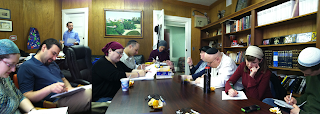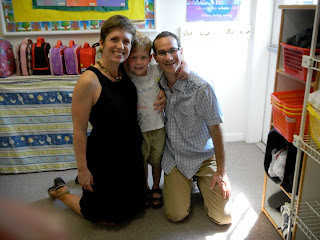Karen Tal-Makhluf, a 2013-2014
PTJL participant, shares her story as a new mom seeking guidance from the
Visiting Moms Program of
Jewish Family & Children's Service. This article first appeared in the
Jewish Journal on Thursday, August 22, 2013.
PEABODY — Like many new mothers, Karen Tal-Makhluf spent the early days after the birth of her first child last fall in a state of exhaustion. Her son — a healthy 7 pound, 8 ounce boy named Ethan — was born after more than 30 hours of labor and an emergency C-section. Although surrounded by her loving husband Joel and a caring extended family, Tal-Makhluf felt lost, confused and unsure of herself. Desperate for some adult interaction, the 29-year-old Peabody mother remembered reading at the hospital about the Lauren & Mark Rubin Visiting Moms program of Jewish Family & Children’s Service, a home visiting program for pregnant women and parents of newborns who want support and companionship, and she decided to reach out. The program was then able to connect her with Arlene Agree, a 61-year old Swampscott mother of three.
Since December, Agree has been making weekly visits to Karen and Ethan, and by all accounts the pairing has been a success, providing muchappreciated support to Tal-Makhluf, and a satisfying volunteer opportunity for Agree.
"I just loved Arlene’s laid back and non-judgmental attitude," explained Tal-Makhluf. "I had never looked after any baby in my life. Everything was a new experience for me, and it was lonely being all day with a baby and not knowing what to do. Nothing can truly prepare you for what to expect during motherhood. I wanted to do everything right, and was second-guessing myself. Arlene has a very practical sense of motherhood and raising children. She is very comforting and soothing. In the beginning you are so tired. It seems like so much work to pack up the baby and diaper bag to go out, and yet you are so desperate for adult interaction. It was so nice to have someone come to my home, and hold the baby and really listen to me. It means the world. What I love about the program is that it focuses on supporting moms."
According to Debbie Whitehill, a licensed social worker and director of the Visiting Moms Program, Tal-Makhluf’s experience is common to new mothers of first or subsequent children. The home visitation program is based on the recognition that parenting is a genuinely difficult job, and that most mothers are unprepared for the magnitude of stresses and new challenges. For nearly 25 years, the Visiting Moms program now available on the North Shore has served hundreds of mothers and babies in the Greater Boston area annually. Trained volunteers visit mothers and their babies at home for one hour a week through the first months of infancy or up to the baby’s first birthday. The free program is open to families of all faiths and races.
"What we are hoping is that the additional support we offer to moms with newborns will help them gain confidence and competence in their parenting role," Whitehill said. "We do that through supportive, nonjudgmental, empathic relationships."
New moms are referred in a variety of ways. Typical issues for new mothers run the gamut from being far away from family and feeling isolated, to being sleep deprived and feeling insecure about decision making, to feeling overwhelmed with responsibility for the care of another life 24/7, to more significant adjustment issues such as post-partum depression and anxiety.
Volunteer "moms" such as Agree receive 10 hours of training before beginning visits, and are continually supervised by clinicians on staff. The ultimate goal is for volunteer moms to play a supportive role for the new parent.
Agree, a seasoned volunteer and now a new grandmother herself, finds the role especially fulfilling.
"This for me has been the most successful volunteer position I have ever held because by working one-on-one with someone, you really feel you are making a difference," she said. "I have found being a mother really fulfilling, and I am pleased to be able to help someone else achieve that."
The Visiting Moms program is continually seeking volunteers. Call 781-647-5327 or go to
www.jfcsboston.org.









.jpg)







.jpg)


.JPG)
.JPG)
.JPG)



